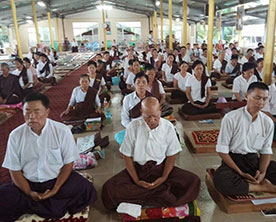Living in Myanmar is a different experience. The whole country is quieter, calmer than the rest of bustling Asia, beautifully, naturally green, with an unparalleled aura of peace. This is seen even in its biggest cities like Yangon and Mandalay, which have all the features of buzzing commercial centers, and yet have a soothing effect. It’s the tranquil air that touches deep, and most who experience it, opt to stay on. A far cry from lives many of us have left behind, to set up homes in Yangon, we now shun the noise, frenzy, stress and rush that is a part of daily lives in places not far from here. Many of us have turned to Buddhist meditative practices, and now understand how little we need to survive, and while we have not yet renounced material belongings, the craving for more, has dissipated.
The peaceful ambience has to be witnessed and experienced in person, to comprehend what it means to have a calm existence, without any rush or frenzy, without noise and pollution, without panic and chaos of multitasking which at best, yields halfbaked solutions to multiple issues. The people also appear so calm and gentle by nature, there are no loud haranguing voices, no shouts and fights, only soft sounds of conversations even in cafes and tea shops. This can be attributed to their Buddhist beliefs, with 90% of the population following Buddhism. Meditation is a way of life, an essential that they turn to, frequently, and most people try to take a few days off annually, for mediation retreats in monasteries in some part of the country.
Myanmar’s association with Buddhism and meditation is centuries old, actively supported by royalty down the ages, and meditative practices were passed on from masters to disciples, generation after generation, and never getting lost. The Vipassana technique of mediation, though originated in India, continued only in Myanmar in its pristine form, while getting lost for centuries where it started. Today, mediation in various forms is spreading all over the world, and many of those carrying this torch have taken their first steps on this path, in Myanmar.
Yangon then, is the ideal, perfect place to learn meditation, with its numerous meditation centers offering comfortable though basic living facilities, and these too, free of cost. Any donation made to compensate for expenses is highly appreciated but remains optional. It is only if one goes for a mediation course that combines yoga, nature walks and meditation and is organized by travel agencies, that one has to pay, depending on the duration and quality of living quarters.
What is Meditation all about
There is always an urge to improve as human beings, meaning that we would like to get rid of our bad habits, vices, negative thinking patterns, and develop a pure mind, far removed from venomous thoughts, ill-feeling towards others, and never wanting to hurt or harm anyone by our words and actions. This is possible only if we develop a razor-sharp mind that stops us before we make a wrong move or utter hurtful words, develop empathy and move towards a high level of purity that touches the core of our being. Meditation is the only way to self-purification.
Asian cultures have inculcated a need for spiritual elevation as one gets on in age. However, in recent years, the spiritual journey for many, begins once they cross twenty and seek a meaning and purpose in life, beyond the material and the mundane. All the meditation centers have a significant number of disciples in their twenties, and some even conduct special courses for teenagers.
Our lives that focus on the physical and material cause only pain, misery, jealousy, craving and aversion. Spirituality and its pursuit lifts us above these. Meditation is the route to freedom from all misery-causing factors, like the ego, which is often the root cause of all negative sensations and aversions in our body. Forgetting the “I” and overcoming self-importance is the only way we can reach the stage of non-self. In the present age, self has become most important and all our actions are about self-gratification, the rest of the world ceases to matter.
Mediation helps us make our mind calm and through introspection, looking inwards rather than outwards, we achieve peace. It involves different ways and methods, though the end goal is the same, achieving peace and rising above misery. One can focus on an object, a part of the body, an action like walking, but all the time, being mindful. One practices moment to moment awareness of the physical and mental state, observing every sensation that arises and passes away. This helps us understand how impermanent everything is, every feeling that comes, goes away, whatever begins will come to an end. We observe and we understand, and eventually imbibe this well enough to apply this truth to every aspect of our daily life.
Meditation need not stretch for 24 hours, day after day. It has to be learnt, and then practiced, preferably daily, whenever one can spare the time. It does require quiet surroundings to facilitate concentration, at least initially, till one has reached such an advanced stage that noise and surroundings no longer distract.
Meditation Centers in Yangon
There is always a long waiting list of prospective students of meditation, both local and international. Before enrolling at any center, it is important to know the precise meditative practices taught and practiced at each of these, and see which one we resonate with. Some teaching walking and sitting meditation, both being an exercise in mindfulness. All the centers have comfortable living quarters, separate for men and women, provide simple, nutritious food, and basic facilities to accommodate new and old students. The rooms do not have any phones and it is generally recommended to not carry laptops, smart phones, books or reading material. Communication with the outside is possible through the office which has international calling facilities, fax machines etc. Doctors are available for medical emergencies.
Most centers teach Vipassana using the Mahasi Sayadaw method. Dhamma Joti Vipassana center was set up by S N Goenka and follows the tradition of Sayagi U Ba Khin. In most centers it is possible to receive instructions in English as well. Every year, thousands of international and local students of all age groups enroll for courses in these centers. The daily practice begins at dawn though timings of different centers vary, and continue till nearly 10 pm, with breaks for food and rest. There is time for individual mediation and group sittings, and teachers are available for improving the meditation technique and resolve doubt. For the few days spent in these centers, living is confined to one’s own physical frame, where one focusses on mindful actions of oneself, and not interact with others at all. Even eye contact is avoided.
Students are expected to adhere to the rules and regulations of the center, follow the eight precepts, practice noble silence, and eat twice a day, abstaining from eating after noon time. Beverages are offered in the evening. This gives us a sense of how little we need to survive, and how wasteful our lifestyle is, in the outside world. This may appear tough as an outsider, but once we step in, the purpose spurs us on, and the focus is on learning alone.
Some of the mediation centers in Yangon are listed below:
- Dhamma Joti Vipassana Center
- Chanmyay Yeiktha Meditation Center
- Mahasi Sasana Yeiktha Mediation Center
- Panditarama Meditation Center
- Shwe Oo Min Dhamma Sukha Yeiktha
- International Theravada Buddhist University
For those wanting complete solitude away from the city, can opt for the few forest retreats in Myanmar, like the Pak Auk Forest Monastery in Mon State, and the Panditarama Forest Monastery not far from Yangon










